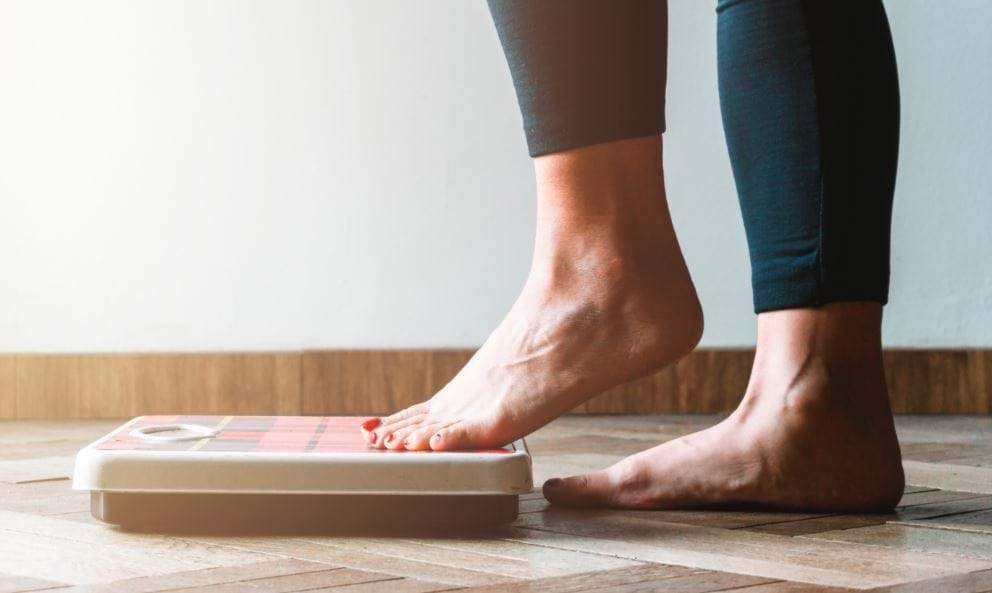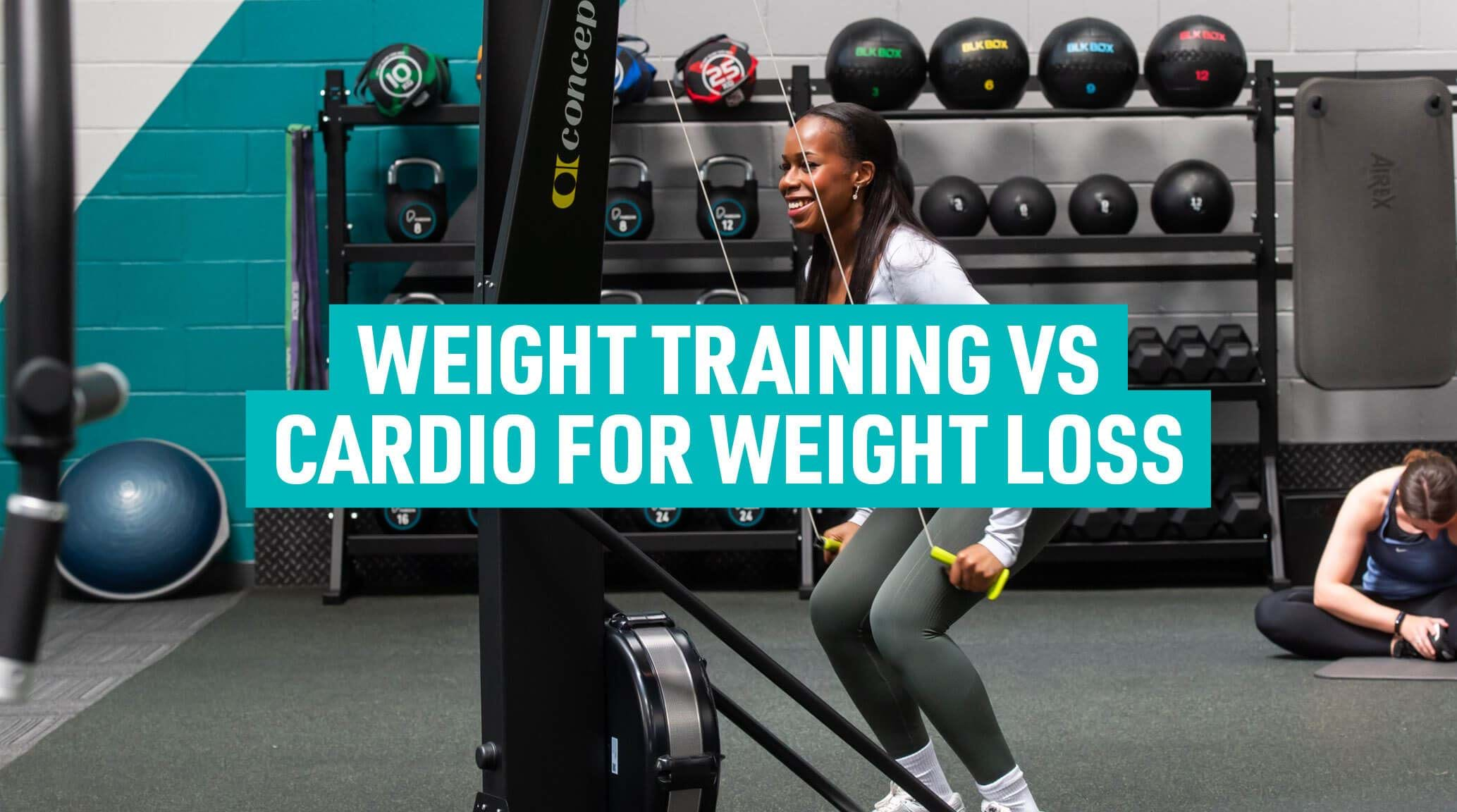Everything You Need to Know About Losing Weight Fast

Page last updated: 10th March 2022
It's very easy to be impatient once you've decided to start a weight loss journey - you're eager to see results, hit your goals and lose weight as fast as you possibly can. There are countless diet and exercise programmes claiming to offer the quickest way to lose weight, but just how achievable, effective and, most importantly, healthy is fast weight loss?
In this article we'll be covering:
- Is fast weight loss healthy?
- What are the risks of losing weight too fast?
- Can rapid weight loss be good for you?
- How quickly should you aim to lose weight?
- How many calories should you be eating to lose weight?
- Does fasting help lose weight fast?
- What is the best exercise to lose weight fast?
- Will losing weight quickly cause loose skin?
Is fast weight loss healthy?
It's important to start by noting that everyone's bodies, goals and processes are different, and what works for one person may not be right for someone else. Similarly, a healthy approach for one individual isn't necessarily the same across the board. A heavier person who's carrying more fat, for example, might expect to lose weight more quickly than a person who's just trying to shift a few pounds.
How healthy weight loss is often depends on the methods you're using and just how fast you're slimming down. If you're still eating a healthy amount of calories and ensuring your nutrition is balanced, and if you're undertaking a workout program that's challenging without exhausting yourself and your body, then your weight loss is likely to be healthy. If, however, you're dramatically below your recommended calories, you might be losing weight quickly, but in a less healthy way that could have a damaging effect on your body.
What are the risks of losing weight too fast?
Losing weight too fast can carry some risks, such as:
- Unsustainability
Putting your body through an intense diet and workout regime to lose weight very quickly can be extremely difficult to keep up over time. It's less of a lifestyle change and more of a quick fix. Crash diets in particular can be very unsustainable, risking regaining the weight you lost once you return to your regular eating habits.
- Electrolyte imbalance
This is when the food you consume isn't providing you with the right balance of electrolytes (for example, salt, potassium, chloride, magnesium and phosphate). These are key components in your body that help with vital processes such as your immune system, blood glucose levels, blood pressure, bone health, digestion, and muscle and nerve functions. While it's natural for electrolyte levels to fluctuate, consistently toying with the balance your body needs to function could lead to issues such as cramping, fever, breathlessness, fatigue, confusion, headaches, irregular heartbeats and convulsions.
- Malnutrition
As with electrolytes, a nutritionally well-rounded diet keeps your body fuelled with all the nutrients, vitamins and minerals it needs to stay fit, healthy and happy. If you're majorly restricting your diet then you are very likely missing out on key nutritional benefits and could face the symptoms of deficiencies. For example, cutting carbs could mean you're not getting enough fibre (which can result in constipation, nausea or blood sugar fluctuations) or completely removing dairy from your diet could mean a calcium deficiency (which can lead to brittle bones and even osteoporosis). It's worth considering your diet changes carefully and finding alternative sources to provide your body with enough energy and nutrients to thrive.
- Decreased muscle mass
When you lose weight too quickly, sometimes the body turns to muscle mass for fuel. So while you're technically lowering the number on the scales, you're actually losing vital muscle mass. Muscle isn't just essential for keeping your body moving effectively and looking toned; it's also more metabolically active than fat, helping to burn more calories.
- Fatigue
Stripping your body of the nutritional energy it needs, particularly if paired with intense exercise, can lead to exhaustion and fatigue. You may struggle to make it through the working day without feeling extremely tired. When your body's fatigued it may crave high calorie foods, or be less inclined to head to the gym, creating a cycle that's both erratic and unhealthy.
- Low mood or irritability
If you're exhausted from pushing yourself in the gym without the right nutrition to maintain your energy levels, you could find yourself not just undoing the fantastic mood-boosting effects of exercise, but actually feeling more stressed, grouchy or emotional. Fatigue and hunger can lead to low moods, which in turn can leave you feeling too lethargic to focus or find motivation.
And it's not just those - other potential risks from rapid weight loss could include:
- Headaches
- Dizziness
- Hair loss
- Menstrual irregularities
Can rapid weight loss be good for you?
But is losing weight quickly just a totally unhealthy approach? Can it be a positive part of a wellbeing journey? The truth is, yes it can be, but again it really depends on your body type and health goals.
Some people have much faster metabolisms than others and may find the weight loss process happens quicker as a result. Often those just starting out with healthy eating and exercise will lose weight at a higher rate initially (usually in the first couple of weeks) as their body adjusts to the new routines and releases water weight. This will usually then slow down to a more regular rate of loss as these changes become a more regular part of their lifestyle.
It's not necessarily the speed of weight loss that can be unhealthy (unless you don't need to lose weight, or are losing weight due to ill health), but the process by which you're achieving it. While focusing on losing weight, it's important to consume a well-rounded, healthy diet that supplies your body with the energy, fuel and nutrition it needs to function effectively. If you're doing this, and including a thought-through exercise programme, then you'll most likely be losing weight in a healthy way.
If you have concerns that you're losing weight too fast, it might be worth speaking to your GP or a nutritionist to ensure you're taking the correct approach.
How quickly can I lose weight?
As already mentioned above, there are many different factors that can affect your speed of weight loss. However, the NHS recommends a steady rate of around 0.5-1kg (1-2lbs) loss a week is a healthy goal, which should ensure you're still consuming enough calories to keep your body in good physical condition.
How many calories should you be eating to lose weight?
Calories are the unit used to measure the energy provided by the food and drink we consume and are essential to keeping our entire body functioning well. If your eating habits mean you consistently consume more calories than you burn through exercise or daily movement, your body will store those extra calories as fat and you'll most likely gain weight. On the other hand, if you consistently consume fewer calories than you burn each day, you should start to lose weight.
As a very top level figure, it's generally recommended to cut your calories consumed to around 500 lower than you're burning each day, depending on your starting weight. This means understanding how many calories your body burns, so you can reduce the number by between 500.
Your body burns calories just by carrying out basic functions such as breathing or pumping blood (this is your BMR), and also by minor activities such as stretching, walking around your home or fidgeting (your NEAT), as well as from larger activities such as hiking, running or working out. All of this will add towards your Total Daily Energy Expenditure (TDEE) which is the total number of calories your body has burned each day.
It's important to note that it's widely recommended to consume no fewer than 1,200 calories a day to keep your body healthy. We've written a detailed guide to explain more about how many calories you should be eating to lose weight, as well as how to track and understand the energy in your food and drink.
Does fasting help lose weight fast?
Fasting (usually referred to as Intermittent Fasting or IF) is an eating pattern that is increasingly popular with many people hoping to lose weight. This generally entails restricting the time frame in which you eat food rather than how much of it you eat. For example, with 16:8, you would stick to an eating window of 8 hours (say, between midday and 8pm) and just drink water, black tea or black coffee for the other 16 hours. Other people prefer a 20:4 approach.
Intermittent Fasting alone (without altering your calorie consumption) is unlikely to help you lose much weight - although there is an argument that your body burns fat more effectively if you leave a longer gap between meals. The reason IF is popular as part of a weight loss approach is that it can help to control how much you're eating, as you simply have a shorter amount of time to be consuming food. If you're prone to late night or mid-morning snacking, for example, a restricted eating window could help cut the temptation to thoughtlessly graze.
For IF to be truly effective though, you really still need to be addressing your calories and continue to stick to a healthy number below your TDEE. However short you cut your eating window, it's still important to ensure you're eating enough calories with a good nutritional balance.
Learn more about intermittent fasting with our guide.
If you're fasting for religious reasons, you might want to check out our separate guide to exercising and working out during Ramadan.
What is the best exercise to lose weight fast?
We say it all the time, but often the best exercise is one you enjoy, so you're more likely to stick to a consistent workout routine. That said, when it comes to weight loss we often recommend a good balance of cardio and strength training to ensure you're burning calories, building muscle and toning up at the same time.
There are a lot of "super intense" workout programmes out there that inevitably promise to help you achieve results far above what any mere mortal could imagine during a normal gym session, "as long as you're willing to give it 100%!"
The thing is, while high intensity training can help you achieve some great fitness milestones if done in a reasonable, structured manner, there is only so much exercise you should be doing, and pushing yourself above and beyond the point of overtraining will lead to burn out, not better results.
No matter the type of workout you do, fat loss still comes down to maintaining a caloric deficit in the "sweet spot", and muscle building comes down to fatiguing a muscle and allowing it adequate recovery time. Injuring yourself won't help you get around the fact that substantial changes to your body composition will take time, consistency, and patience to achieve.
You'll be able to find plenty of great workout ideas over on our How to Lose Weight hub, but why not start with some of the below?
- Walking your way to weight loss - perfect if you're just starting out and are keen to get some fresh air as you burn calories
- Best exercises for weight loss - a good all-round range of movements you can include in your workouts to burn calories
- 6-week gym weight loss workout plan - we always recommend creating a plan before you start working out to help keep you focused. This guide will help you on your journey to meet your goals
Weight training for weight loss - if you're not a fan of cardio, or simply want to integrate weight training into your existing workout plan, check out this guide
Will losing weight quickly cause loose skin?
In some cases, very fast weight loss can indeed lead to loose skin, often around the chest, arms or stomach. This usually occurs when fat has been burned so quickly the skin around it hasn't had a chance to adjust and tighten up around the body, but can also be common when a large amount of weight has been lost (say, 40kg or 100lbs). In some cases, this skin will start to tighten over time, but it's usually extremely difficult to get rid of loose skin naturally and some people may turn to surgical procedures to remove it.
The best way to avoid loose skin is to lose weight at a more gradual, sustainable pace, while keeping up a consistent workout routine to help tone as you go.
How to lose weight safely
So, to summarise, fast weight loss itself isn't inherently unhealthy, but nutrition and general wellbeing need to be carefully managed to keep you in the best possible health both physically and emotionally. A more gradual approach to weight loss tends to be most effective in terms of consistency and sustainability.
We have plenty of healthy recipes over on our Nutrition & Diet Advice hub. If you're not sure where to start with your weight loss journey, consider booking in a session with a Personal Trainer - they're experts in helping you meet your goals, and can work with you to build an effective fat burning plan. Find a gym near you and get started today!


